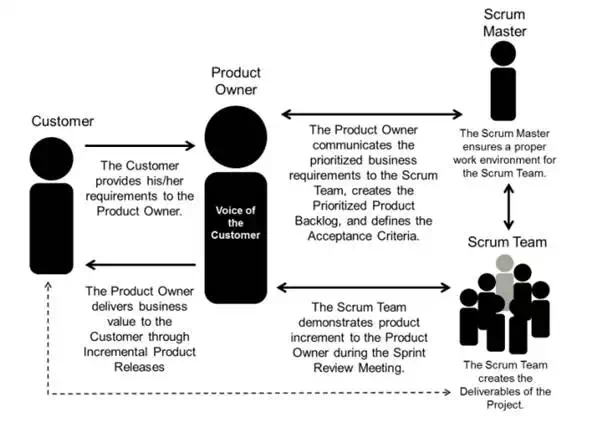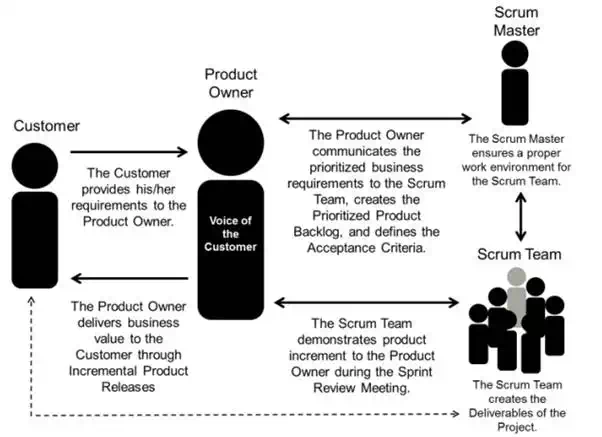The scrum framework for project management continues to evolve, but one theme seems to remain when companies are considering going agile: “Do I need to add a Scrum Master and scrum team to make this work?”
The quick and easy answer, if you’re considering the shift from a traditional waterfall-style delivery process, is YES.

You might be asking about scrum because you read about it on a popular tech blog, overheard buzz about it at a coffee shop, or saw a presentation at an industry convention.
Regardless of the channel, it is indisputable that people are talking about scrum, and the buzz continues to grow.
All of this discussion is with good reason, and when performed correctly, scrum is the way to go for many businesses. In order to carry out scrum to the fullest potential, having a high caliber scrum master in your organization is invaluable.
This role is not a one-size-fits-all individual, but instead requires a specialized yet highly adaptable problem solver who has to potential to make your organization realize goals that were previously out of reach.
Agile and Scrum techniques can be implemented partially without a scrum master, but without the results of having the most efficient team structure.
Agile Methodology, Scrum and the role of the Scrum Master


As evidenced by multiple Global Scrum Gatherings scheduled in Dublin, London and across the United States in 2017 and 2018, scrum is growing in practice and businesses are acknowledging the value.
A valuable member of a true scrum team is the scrum master, and more professionals are signing up for the required certification classes every day.
Scrum alliance reports nearly half a million Certified ScrumMasters as of November 2017.
While more and more areas of delivery are being upgraded with agile and scrum, some key domains are outlined in the rest of this article to highlight benefits and applications.
Software Development
Possibly the most common, and quickest to implement, industry for scrum adoption would be the world of software development.
A good scrum master on a software development project is an indispensable asset.
It is a fact that businesses developing software at scale will run into roadblocks along the way.
In the past, the solution would be to remove a skilled developer from time spent adding lines of code, and have that individual spend time chasing a solution.
Instead, adding a scrum master role into your organization inserts a problem solver who is experienced and ready to attack the problem quickly, allowing the developer to focus on the expected work without missing a beat.
Less context switching and distractions for your software developers means your code will be written more efficiently and delivered quicker for your next demo.
Manufacturing
Scrum implementation also has proven merits in the realm of physical production and manufacturing.
While the key principles outlined in the Agile Manifesto itself speak specifically to software, the theory can be applied to product manufacturing in a similar fashion.
Comparable to finding bugs in a live system for software projects, issues with manufacturing are often found after the product is in the hands of the customer.
Making new products opens a business up for this inherent risk, but a scrum master can alleviate the pains.
Production errors can be costly to investigate, mitigate, and correct.
If you have a scrum master involved in your production practice, problems can be identified much earlier in the supply chain. If an agile shop is lacking a scrum master, someone from the core production team would lose momentum and valuable efficiency would be lost and the chain would be halted.
Defects don’t get packaged and delivered to customers, bad experiences are avoided, and your customers are more likely to recommend and shop with you again.
See the Toyota Production System use case for a prime example of scrum in manufacturing.
Financial Institutions
Money, whether it belong to an individual or a large corporation, should always be managed in ways that minimize risks associated with preventable errors.
Learning how to use scrum teams and scrum masters is something that successful institutions have been doing for years.
A well-groomed product backlog where a scrum master drives the team to success means that the institution can learn fast from any mistakes early on.
Fixing these early mistakes is how the scrum master serves to save the institutions, and their customers, from magnifying risk of losing money and other services.
Government Offices
In many areas, government processes are notorious for taking more time and costing more money than most deem appropriate.
Government offices using traditional contracts can focus on misleading milestones and waste sums of money, like when the FBI spent $575 Million over 5 years on software that was never finished.
Under this approach, errors in requirements and scope typically are uncovered after it is far too late to make meaningful adjustments.
The solution, as with previous scenarios, could be implemented by involving a scrum master to ensure delivery in on track.
Regular scrum practices of reviewing the backlog and involving the stakeholders for frequent approvals at defined intervals create a win-win situation for the contractors and the government agency.
Consulting Agencies
Some businesses have decided to go in the direction of scrum, but are not implementing the practices and techniques well.
Making the transition away from waterfall is not one that companies are willing to make in-house, and an agency can take advantage of these opportunities.
At a consulting agency, a scrum master with the ability to work on multiple scrum teams can serve to multiply efficiency and value for your clients. In turn, your clients increase revenue, are able to kick off more projects, and return to your agency for a desirable scrum master.
Having this skill-set in your collection of services is a simple way to add replicable value drivers across not only your teams, but also the deliveries of projects that convince your clients to return for repeat, larger, and more efficient contracts.
Disrupters
Other industries that are primed for scrum growth fall under the broader umbrella of “disrupters,” such as Uber and Airbnb.
From technology to services industries, these organizations build upon self-discovery and are making news every day.
Businesses in this field thrive on adaptability and flexibility, core pillars of going to scrum methodology.
A scrum master embodies this attitude, and enables new or drastically changing businesses to do what works, and nothing that does not.
Businesses in this market are constantly running into impediments that no other business has seen before, and having a scrum master to step in with a solution means more progress in disrupting the space and allowing rapid growth.
Bottom Line
There are many benefits to shifting your business from a traditional waterfall methodology to a more agile scrum approach. In addition, the shift can be strategically rolled out with as little as one single scrum team with a skilled scrum master.
You can recognize the benefits right away, by virtue of the scrum methods and proven reporting tools that are already defined for you. If results aren’t immediate, you will immediately have the data to make the decision with your scrum master to adapt and quickly modify your approach so that more desirable results are achieved at the next sprint.


